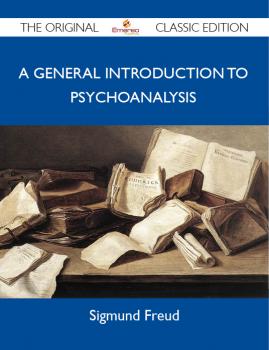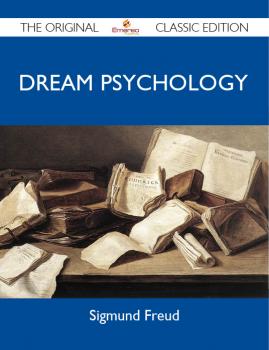ТОП просматриваемых книг сайта:
Freud (Hg.) Sigmund
Список книг автора Freud (Hg.) SigmundАннотация
While Freud generally has a pretty clear writing style, in this book he assumes absolutely no knowledge of psychoanalysis or his writings whatsoever. A great introduction to Freud for anyone! <p> This is a high quality book of the original classic edition. <p> This is a freshly published edition of this culturally important work, which is now, at last, again available to you. <p> Enjoy this classic work. These few paragraphs distill the contents and give you a quick look inside: <p> They have given the world a new conception of both infancy and adolescence, and shed much new light upon characterology; given us a new and clearer view of sleep, dreams, reveries, and revealed hitherto unknown mental mechanisms common to normal and pathological states and processes, showing that the law of causation extends to the most incoherent acts and even verbigerations in insanity; gone far to clear up the terra incognita of hysteria; taught us to recognize morbid symptoms, often neurotic and psychotic in their germ; revealed the operations of the primitive mind so overlaid and repressed that we had almost lost sight of them; fashioned and used the key of symbolism to unlock many mysticisms of the past; and in addition to all this, affected thousands of cures, established a new prophylaxis, and suggested new tests for character, disposition, and ability, in all combining the practical and theoretic to a degree salutary as it is rare. <p> …Despite the frightful handicap of the odium sexicum, far more formidable today than the odium theologicum, involving as it has done for him lack of academic recognition and even more or less social ostracism, his views have attracted and inspired a brilliant group of minds not only in psychiatry but in many other fields, who have altogether given the world of culture more new and pregnant appercus than those which have come from any other source within the wide domain of humanism. <p> …If psychologists of the normal have hitherto been too little disposed to recognize the precious contributions to psychology made by the cruel experiments of Nature in mental diseases, we think that the psychoanalysts, who work predominantly in this field, have been somewhat too ready to apply their findings to the operations of the normal mind; but we are optomistic enough to believe that in the end both these errors will vanish and that in the great synthesis of the future that now seems to impend our science will be made vastly richer and deeper on the theoretical side and also far more practical than it has ever been before. <p> …Another series of such occurrences is based on forgetfulness?but on a forgetfulness which is not permanent, but temporary, as for instance when one cannot think of a name which one knows and always recognizes; or when one forgets to carry out a project at the proper time but which one remembers again later, and therefore has only forgotten for a certain interval. <p> …If you can explain to us how an individual with sound eyes and ears can, in broad daylight, see and hear things that do not exist, or why another individual suddenly believes himself persecuted by those whom up to that time he loved best, or defend, with the most ingenious arguments, delusions which must seem nonsense to any child, then we will be willing to consider psychoanalysis seriously.
Аннотация
This is an excellent work for Freud enthusiasts. The work discusses the theoretical underpinnings for behavioral characteristics popularized by Freud. <p> For instance, the proclivity to forget is related to a personal motivation to suppress unpleasant memories. Dreams tend to depict unfulfilled wishes. Pain and disgust are more frequent aspects of dreams than pure pleasure. The author explains how childhood experiences both good and bad may resurface in our dreams. Our memory can be challenged to recall things long dormant. Night hallucinations can be due to perceived rejected sexual impulses. <p> Freud explains how seemingly contradictory thoughts can coexist side by side. The concept of psychological tension may be related to a displeasure or aversion. Freud discussed sexuality. For instance, he noted that bisexual tendencies could be interpreted within the context of a female brain in a male body. The book brings out many aspects of human behavior that we rarely dwell on consciously. It is perfect for a class project in science, psychology or medicine. Freuds theories tend to be very complex. <p> This work reduces some of the deepest complexities to simple English. Finally, the book helps us to understand the dynamics of why we behave as we do. <p> This book explains important strategies to the classic flight/fight phenomena and accomodative strategies aimed at reducing behavioral tensions/conflicts.
Аннотация
Whether we love or hate Sigmund Freud, we all have to admit that he revolutionized the way we think about ourselves. Much of this revolution can be traced to The Interpretation of Dreams, the turn-of-the-century tour de force that outlined his theory of unconscious forces in the context of dream analysis. Introducing the id, the superego, and their problem child, the ego, Freud advanced scientific understanding of the mind immeasurably by exposing motivations normally invisible to our consciousness. While theres no question that his own biases and neuroses influenced his observations, the details are less important than the paradigm shift as a whole. After Freud, our interior lives became richer and vastly more mysterious. <p> These mysteries clearly bothered him–he went to great (often absurd) lengths to explain dream imagery in terms of childhood sexual trauma, a component of his theory jettisoned mid-century, though now popular among recovered-memory therapists. His dispassionate analyses of his own dreams are excellent studies for cognitive scientists wishing to learn how to sacrifice their vanities for the cause of learning. Freud said of the work contained in The Interpretation of Dreams, Insight such as this falls to ones lot but once in a lifetime. One would have to feel quite fortunate to shake the world even once <p> Make up your own mind about Freud, but in the meantime, this is one of his great works that anyone can read without having technical knowledge about psychology. Freud included much about his own dreams, and the reader will suspect that he didnt tell all about his own introspection–nor would most of us! But this work, along with The Psychopathology of Everyday Life and Wit and Its Relation to the Unconscious are for all readers. It is worth your while to peruse one of the most influential books in human history. As for the violence of the controversy that Freud inspires–well, that vehemence must mean something: a hundred years later, we are still at it. Decide for yourself.



